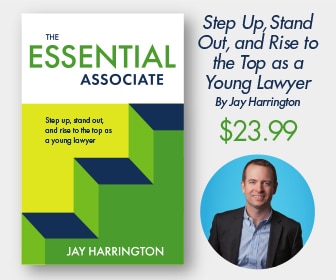Ever wonder why some writers get all the attention online? Their posts get shared, their personal brands grow, their email lists swell, and their fortunes rise as their content receives an outsized share of eyeballs.
It’s easy to dismiss their success as luck, by concluding that it resulted from a post going viral (as if hitting “Publish” is the same as pulling the lever on a slot machine), or connections with influencers that others don’t have. Meanwhile, we keep publishing but never gain traction. We preach to the choir of a stagnant email list and collect a few random likes and shares on LinkedIn. As our progress stalls so does our output. Before long, we conclude this “content thing” isn’t worth the time and we go back to billing hours and researching the next marketing trend to chase.
The truth is, those who break through are fundamentally no different from the rest of us. They just act differently. They know what it takes to produce content that cuts through the noise and provides real value to readers. In fact, readers perceive their content to be so valuable that they share it with others in their networks — they’re smarter for having read it and assume (rightly) that members of their own networks will think more highly of them for having exposed them to it as well.
Why “Value-Based” Content Should Be Your Goal
As a content-producing lawyer, you may have many objectives in mind. You may hope to develop business or raise your profile and build your personal brand. These are worthy goals, but they will only happen as a byproduct of focusing on providing real value to your readers. One of the best ways for lawyers to build personal brands and develop profitable books of business, therefore, is to engage in value-based content marketing.
In a world filled with immense complexity and noise, old marketing tactics based on interrupting prospective clients by shouting brand messages at them no longer work. Instead of trying to drag clients away from what interests them, you need to become what they are interested in by providing them with valuable content.
As lawyers, we all hope to be perceived as trusted advisors. Trust, after all, is the most important currency of business development. But too often we forget that trust is an outcome, and not something that is present at the start of a new relationship. We can’t position ourselves as trusted advisors — that’s a label others must bestow on us. We must first advise, and if our advice is valuable enough, people will listen. We must first establish authority through insights and education before trust is gained.
Content marketing is all about an exchange of value — you give them your wisdom, they’ll give you their attention. The question then becomes: How do I produce content so valuable that it will build my authority and my personal brand?
Three Tips for Creating More Value
Here are my top three ways you can create value and lay the foundation for business development with your content.
1. Understand your audience. To build a powerful personal brand, you need to specifically define the target market you serve. Before even thinking about generating awareness of your brand and your services through your content, you need to answer the question: Awareness by whom, of what?
Clients are increasingly seeking out narrow specialization in the products and services they buy. They aren’t looking for someone or something that can generally solve their problems or satisfy their needs. They’re looking for someone or something that can specifically do so.
To build your personal brand, you need to pick a niche. Lawyers with strong personal brands stand for something. And for those with the strongest brands, “something” means one thing. Well-branded lawyers are master craftsmen, not jacks-of-all-trades. A master craftsman lawyer knows what she does, how she does it and for whom.
To add value, you need to know who you serve so that you can have a meaningful and contextualized conversation with them through your content. Having a niche allows you to craft a tight, relevant message to a specific audience, rather than an overly broad, watered-down message to a wide audience. By knowing who you serve you can speak their language. You can express understanding of the challenges they face, and provide specific solutions. Perhaps most importantly, you can publish your content in places where your niche audience spends their time and devotes their attention.
2. Give freely with no expectation of reciprocity (at least in the short-term). Value-based content marketing is the long game. I’ve made this point already, but it bears repeating: Before you can develop business from someone, you first need to build trust with them. This means approaching content marketing with a service mindset. It means giving freely of yourself with no expectation of reciprocity. It means sharing wisdom and resources and being of service to others. It doesn’t mean chasing likes, seeking affirmation and expecting business to flow immediately. Business will come, but it takes time. Indeed, when we share our time, attention and wisdom freely, with no reciprocal expectations, we build relationships of the best kind: ones built on a strong foundation of trust.
A snowball effect happens when you consistently produce and share valuable content. Over time, people will begin to perceive you as an authority. More people will enter your orbit and pay attention to what you have to say. When someone in your orbit has a problem or an opportunity in an area you’ve written about, you’ll be high on their list as a lawyer who can help overcome the problem, or seize the opportunity, as the case may be. While your reader may not be ready to act immediately, additional thought leadership will keep you top of mind. When the time is right the relationship will shift from one of reader-writer to that of client-attorney.
Lots of lawyers go through the motions, hold back information, and “check the box” when it comes to the content they produce. This is the path to anonymity online. To stand out and get the snowball rolling, you need to be generous and share the best of yourself.
3. Have your finger on the pulse of what matters. Great writers are voracious readers. As Stephen King once wrote, “If you don’t have time to read, you don’t have the time (or the tools) to write. Simple as that.” To add value you need to:
- Express an understanding of your niche audience’s challenges and opportunities.
- Demonstrate authority by providing relevant wisdom and solutions.
To express understanding and demonstrate authority, you must have your finger on the pulse of the industry you’re focused on. This means reading, researching, aggregating and curating relevant information that you can incorporate into your writing. It also means educating yourself, generally, on what’s happening in the world. The best thought leaders stay at the leading edge of their domain of expertise. They also connect the dots between different domains, adding original insights to the conversation taking place among their audience. The best thought leaders in the legal industry also mine ideas from the work they’re doing every day. They understand that if one client within their niche is dealing with an issue, odds are that other similarly situated clients or prospective clients are facing the same issue, or soon will be.
Regardless of Its Form, Produce Valuable Content
While writing is a great foundation for most robust, value-based content marketing efforts, it’s certainly not the only way to reach and build an audience. Lawyers are creatively using video, podcasts, information graphics, SlideShare decks and many other content formats to get their messages out. There is no shortage of outlets for great content. The important thing is to get thoughtful content into the hands, eyes and ears of your audiences to win their hearts, minds and, ultimately, their business.
Related: “To Build Your Personal Brand, You Must Embrace Discomfort”
Illustration ©iStockPhoto.com
Get “One Really Good Idea Every Day”
Sign up for Attorney at Work and help us grow! Subscribe to the Daily Dispatch and the Weekly Wrap (same price: free). Follow us on LinkedIn, Facebook and Twitter @attnyatwork.


















